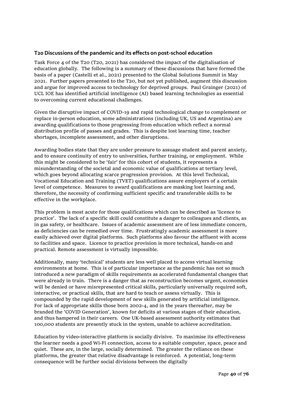
Page 40 of 76
T20 Discussions of the pandemic and its effects on post-school education
Task Force 4 of the T20 (T20, 2021) has considered the impact of the digitalisation of
education globally. The following is a summary of these discussions that have formed the
basis of a paper (Castelli et al., 2021) presented to the Global Solutions Summit in May
2021. Further papers presented to the T20, but not yet published, augment this discussion
and argue for improved access to technology for deprived groups. Paul Grainger (2021) of
UCL IOE has identified artificial intelligence (AI) based learning technologies as essential
to overcoming current educational challenges.
Given the disruptive impact of COVID-19 and rapid technological change to complement or
replace in-person education, some administrations (including UK, US and Argentina) are
awarding qualifications to those progressing from education which reflect a normal
distribution profile of passes and grades. This is despite lost learning time, teacher
shortages, incomplete assessment, and other disruptions.
Awarding bodies state that they are under pressure to assuage student and parent anxiety,
and to ensure continuity of entry to universities, further training, or employment. While
this might be considered to be 'fair' for this cohort of students, it represents a
misunderstanding of the societal and economic value of qualifications at tertiary level,
which goes beyond allocating scarce progression provision. At this level Technical,
Vocational Education and Training (TVET) qualifications assure employers of a certain
level of competence. Measures to award qualifications are masking lost learning and,
therefore, the necessity of confirming sufficient specific and transferable skills to be
effective in the workplace.
This problem is most acute for those qualifications which can be described as 'licence to
practice'. The lack of a specific skill could constitute a danger to colleagues and clients, as
in gas safety, or healthcare. Issues of academic assessment are of less immediate concern,
as deficiencies can be remedied over time. Frustratingly academic assessment is more
easily achieved over digital platforms. Such platforms also favour the affluent with access
to facilities and space. Licence to practice provision is more technical, hands-on and
practical. Remote assessment is virtually impossible.
Additionally, many 'technical' students are less well placed to access virtual learning
environments at home. This is of particular importance as the pandemic has not so much
introduced a new paradigm of skills requirements as accelerated fundamental changes that
were already in train. There is a danger that as reconstruction becomes urgent, economies
will be denied or have misrepresented critical skills, particularly universally required soft,
interactive, or practical skills, that are hard to teach or assess virtually. This is
compounded by the rapid development of new skills generated by artificial intelligence.
For lack of appropriate skills those born 2002-4, and in the years thereafter, may be
branded the 'COVID Generation', known for deficits at various stages of their education,
and thus hampered in their careers. One UK-based assessment authority estimates that
100,000 students are presently stuck in the system, unable to achieve accreditation.
Education by video-interactive platform is socially divisive. To maximise its effectiveness
the learner needs a good Wi-Fi connection, access to a suitable computer, space, peace and
quiet. These are, in the large, socially determined. The greater the reliance on these
platforms, the greater that relative disadvantage is reinforced. A potential, long-term
consequence will be further social divisions between the digitally